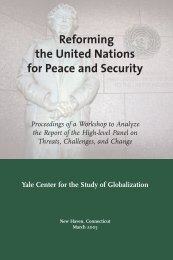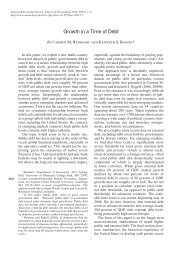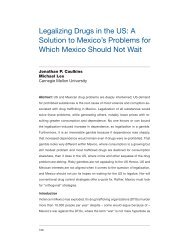The collapse of global trade, murky protectionism, and the crisis:
The collapse of global trade, murky protectionism, and the crisis:
The collapse of global trade, murky protectionism, and the crisis:
Create successful ePaper yourself
Turn your PDF publications into a flip-book with our unique Google optimized e-Paper software.
VOX<br />
Research-based policy analysis <strong>and</strong> commentary from leading economists<br />
…but <strong>trade</strong> integration <strong>and</strong> stronger rules have thus far muted<br />
<strong>protectionism</strong><br />
Several factors have clearly muted protectionist pressures <strong>and</strong> distinguish this <strong>global</strong><br />
downturn from <strong>the</strong> pressures <strong>of</strong> <strong>the</strong> 1930s. Countries are far more interdependent<br />
through supply chains, imported inputs, <strong>and</strong> even services, <strong>and</strong> so export interests are<br />
far more powerful than before relative to pure import-competing industries. <strong>The</strong> simple<br />
average <strong>of</strong> <strong>trade</strong>-to-GDP today is 96% compared to 55% in 1970 – <strong>and</strong> parts <strong>and</strong><br />
components <strong>trade</strong>, an indicator <strong>of</strong> supply chains, has more than doubled as a proportion<br />
<strong>of</strong> total <strong>trade</strong>. Successive GATT/WTO agreements have provided much greater<br />
legal stability <strong>of</strong> trading relations.<br />
Because <strong>of</strong> this quite different political economy today, a few proposed restrictions<br />
have been rejected or not enacted. In Brazil, for example, <strong>the</strong> bureaucracy attempted<br />
to impose widespread licensing arrangements <strong>and</strong> import controls reminiscent <strong>of</strong> <strong>the</strong><br />
1970s, only to provoke a response <strong>of</strong> outrage from <strong>the</strong> private sector that led to immediate<br />
reversal. Similarly, <strong>the</strong> more egregious forms <strong>of</strong> <strong>the</strong> Buy America provision<br />
appear to have been circumvented. Moreover, about 10 <strong>of</strong> <strong>the</strong> 77 proposed <strong>and</strong> implemented<br />
changes in <strong>trade</strong> policies involved steps toward greater liberalisation, mostly<br />
related to free <strong>trade</strong> agreements.<br />
Also, most countries have flexible exchange rates, <strong>and</strong>, as capital has sought safety<br />
in US Treasuries, nominal exchange rates against <strong>the</strong> US dollar have plummeted.<br />
This shift in relative prices domestically has given import-competing interests considerable<br />
protection. <strong>The</strong> floating rate regimes have arguably pre-empted a wave <strong>of</strong><br />
competitive devaluations that disrupted markets in <strong>the</strong> 1930s. For <strong>the</strong> h<strong>and</strong>ful <strong>of</strong><br />
countries intervening in exchange rate markets, it generally has been to prevent fur<strong>the</strong>r<br />
depreciations – such as Argentina <strong>and</strong> Russia. China has apparently ceased accumulating<br />
reserves since October, <strong>and</strong> <strong>the</strong> nominal rate has stabilised after a two-year<br />
20% appreciation.<br />
Forceful leadership can help<br />
<strong>The</strong> cost <strong>of</strong> inaction on <strong>the</strong> Doha Agenda is rising. While thus far most countries have<br />
not raised tariffs to bound levels or taken full advantage <strong>of</strong> headroom on agricultural<br />
subsidies, as <strong>the</strong> recession deepens, many countries may well do so. By <strong>the</strong> recession's<br />
end, it is a safe bet that <strong>the</strong> lower bindings <strong>and</strong> caps on agricultural subsidies<br />
contained in <strong>the</strong> draft texts would have kept many markets open that will be closed<br />
by <strong>the</strong> end <strong>of</strong> 2009. This underscores <strong>the</strong> importance <strong>of</strong> pushing forward with a rapid<br />
conclusion <strong>of</strong> <strong>the</strong> Doha round.<br />
<strong>The</strong> recent decision by <strong>the</strong> WTO membership on 9 February 2009, in <strong>the</strong> Trade<br />
Policy Review Body will, in <strong>the</strong> meantime, contribute to regular multilateral surveillance<br />
<strong>of</strong> <strong>the</strong> world trading system (WTO 2009).<br />
<strong>The</strong> G20, for its part, could adopt additional measures that would streng<strong>the</strong>n <strong>the</strong><br />
fragile consensus against fur<strong>the</strong>r <strong>protectionism</strong>. It could, for example:<br />
• Commit to greater transparency by agreeing to provide quarterly reports on new<br />
<strong>trade</strong> restrictions <strong>and</strong> industrial <strong>and</strong> agricultural subsidies to <strong>the</strong> WTO, toge<strong>the</strong>r<br />
with a m<strong>and</strong>atory analysis <strong>of</strong> <strong>the</strong> <strong>trade</strong> restriction on employment (since this<br />
would create new room for technical analysis <strong>and</strong> political discussion within<br />
member countries).<br />
52





